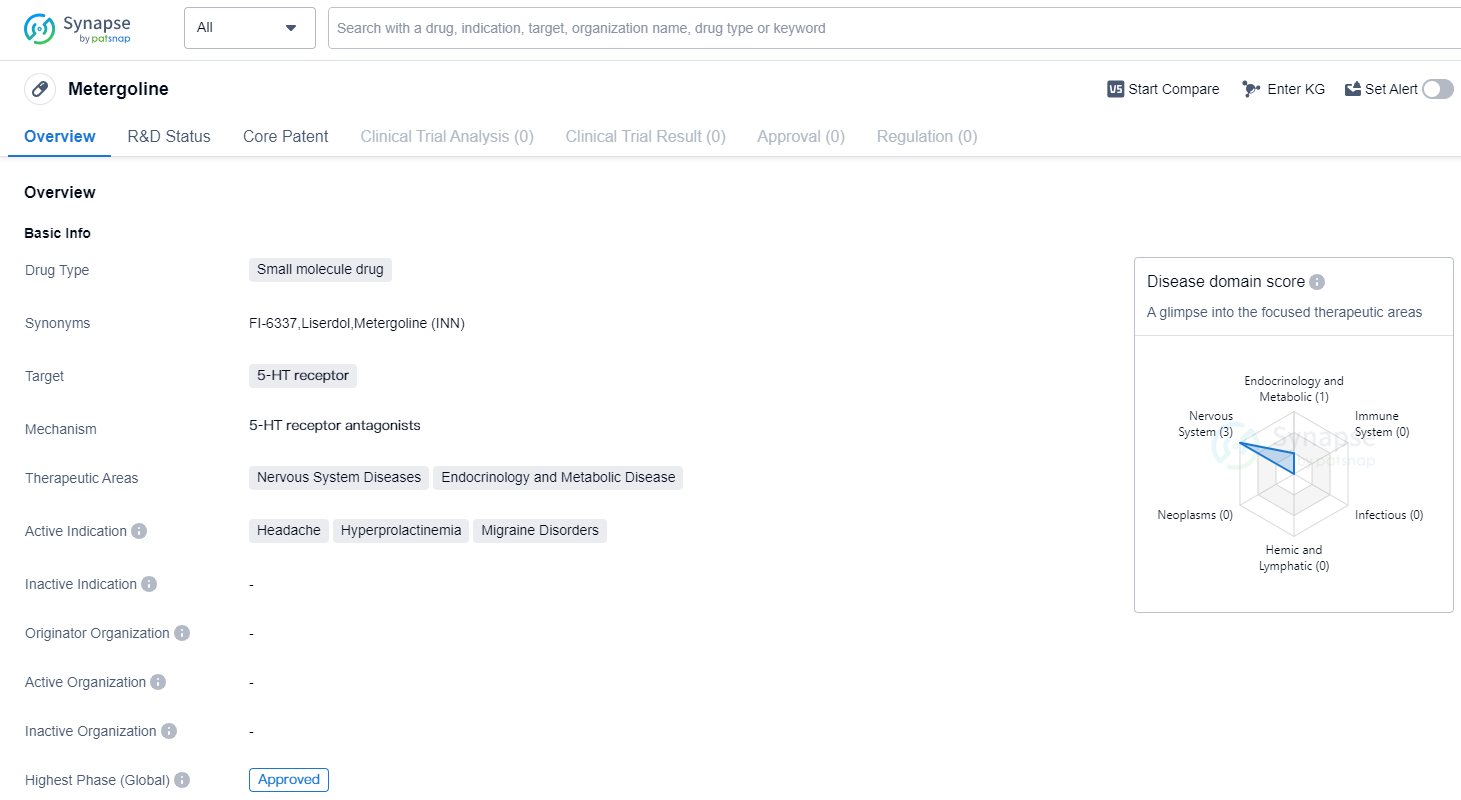Decoding metergoline: A Comprehensive Study of its R&D Trends and Mechanism on Drug Target
Metergoline's R&D Progress
Metergoline is a small molecule drug that targets the 5-HT receptor. It is primarily used in the treatment of nervous system diseases and endocrinology and metabolic diseases. The drug has been approved for use in patients with headache, hyperprolactinemia, and migraine disorders.
Metergoline is classified as a small molecule drug, which means it is composed of low molecular weight compounds. This type of drug is typically orally administered and can easily penetrate cell membranes, allowing for efficient absorption and distribution throughout the body.
The drug specifically targets the 5-HT receptor, which is a serotonin receptor involved in various physiological processes. By modulating the activity of this receptor, metergoline can potentially regulate serotonin levels and influence neurotransmission in the nervous system.
Therapeutically, metergoline is primarily indicated for the treatment of nervous system diseases, which may include conditions such as Parkinson's disease, Alzheimer's disease, and multiple sclerosis. Additionally, it is also used in the management of endocrinology and metabolic diseases, which may involve disorders of the thyroid, adrenal glands, or glucose metabolism.
The active indications for metergoline include headache, hyperprolactinemia, and migraine disorders. Headaches can be caused by various factors, such as tension, migraines, or sinus issues. Hyperprolactinemia refers to the condition of having high levels of prolactin hormone in the blood, which can lead to symptoms such as infertility, irregular menstrual periods, and breast milk production in non-pregnant individuals. Migraine disorders are characterized by recurrent headaches, often accompanied by other symptoms such as nausea, vomiting, and sensitivity to light and sound.
The highest R&D phase of this drug is approved. This indicates that the drug has successfully undergone rigorous testing and evaluation, demonstrating its safety and efficacy in treating the indicated conditions.
👇Please click on the image below to directly access the latest data (R&D Status | Core Patent | Clinical Trial | Approval status in Global countries) of this drug.
Mechanism of Action for metergoline: 5-HT receptor antagonists
5-HT receptor antagonists are a class of drugs that block the action of serotonin (5-HT) receptors in the body. Serotonin is a neurotransmitter that plays a crucial role in regulating various physiological processes, including mood, appetite, sleep, and pain sensation. By antagonizing or inhibiting the activity of 5-HT receptors, these drugs can modulate the effects of serotonin in the body.
From a biomedical perspective, 5-HT receptor antagonists are commonly used in the treatment of various conditions, such as migraines, nausea and vomiting, anxiety disorders, and gastrointestinal disorders. These drugs can have different selectivity for the various subtypes of 5-HT receptors, such as 5-HT1, 5-HT2, and 5-HT3 receptors. Each subtype of receptor has distinct functions and is located in different tissues throughout the body. Therefore, the specific subtype targeted by a 5-HT receptor antagonist determines its therapeutic effects and potential side effects.
Overall, 5-HT receptor antagonists are valuable pharmacological tools in biomedicine for modulating the effects of serotonin in the body and treating various conditions related to serotonin dysregulation.
Drug Target R&D Trends for metergoline
The 5-HT receptor, also known as the serotonin receptor, plays a crucial role in the human body. Serotonin is a neurotransmitter that regulates various physiological processes, including mood, appetite, sleep, and cognition. The 5-HT receptor is a target for many pharmaceutical drugs used to treat psychiatric disorders such as depression, anxiety, and schizophrenia. By modulating the activity of the 5-HT receptor, these drugs can help restore the balance of serotonin in the brain, alleviating symptoms and improving overall mental well-being. Understanding the role of the 5-HT receptor is essential for developing effective medications and therapies in the pharmaceutical industry.
According to Patsnap Synapse, as of 14 Sep 2023, there are a total of 827 5-HT receptor drugs worldwide, from 637 organizations, covering 288 indications, and conducting 5328 clinical trials.
The analysis of the target 5-HT receptor reveals a competitive landscape with multiple companies investing in research and development. Johnson & Johnson, Sumitomo Chemical Co., Ltd., and Novartis AG are leading in terms of the highest stage of development. Approved drugs targeting the 5-HT receptor have been indicated for various conditions such as schizophrenia, migraine disorders, depressive disorder, and bipolar disorder.
Small molecule drugs are progressing rapidly, indicating intense competition around innovative drugs. Further analysis of biosimilars and their research and development institutions is necessary. The United States, China, the European Union, and Japan are the countries/locations developing fastest under this target, with China showing significant progress.
The target 5-HT receptor presents opportunities for further research and development, with potential therapeutic benefits for various indications. Companies should continue investing in R&D to expand their portfolio and capitalize on the growing market for drugs targeting the 5-HT receptor.
👇Please click on the picture link below for free registration or log in directly if you have a freemium account, you can browse the latest research progress on drugs, indications, organizations, clinical trials, clinical results, and drug patents related to this target
Conclusion
In summary, metergoline is a small molecule drug that targets the 5-HT receptor. It is used in the treatment of nervous system diseases and endocrinology and metabolic diseases. The drug is approved for use in patients with headache, hyperprolactinemia, and migraine disorders.






